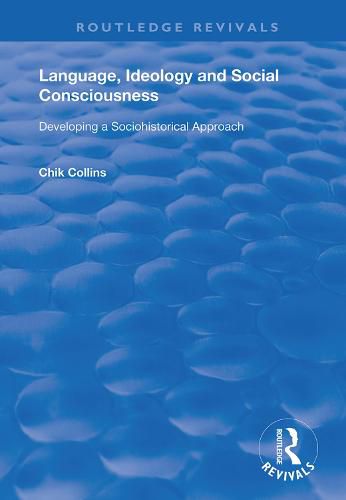Readings Newsletter
Become a Readings Member to make your shopping experience even easier.
Sign in or sign up for free!
You’re not far away from qualifying for FREE standard shipping within Australia
You’ve qualified for FREE standard shipping within Australia
The cart is loading…






Originally published in 1999, this book sets out to develop a distinctive, critical approach to the study of social consciousness through empirical studies of sociopolitical conflict in the west of Scotland. It accords an analytical priority to language-use and provides a critical review of a number of contemporary studies and approaches as part of an emerging presentation of an original and distinctive method.
The book makes a significant contribution to the recovery for social science of the achievements of a set of Marxist psychologists and philosophers of language - most notably L.S. Vygotsky and V.N. Voloshinov - whose potential relevance for political sociology has barely been recognised. It tests and demonstrates the relevance of the approach it seeks to develop in relation to empirical studies - most notably the Upper Clyde Shipbuilders ‘work-in’ of 1971-72 and the Scottish Office-led urban policy ‘Partnership’ in Ferguslie Park, Paisley in the late 1980s and early 1990s. Ultimately, the analytical focus on language becomes a key component of a larger mode of social investigation which begins from an analysis of changing patterns of language-use - one which ‘turns’ to language without embracing the ‘linguistic turn’.
$9.00 standard shipping within Australia
FREE standard shipping within Australia for orders over $100.00
Express & International shipping calculated at checkout
Originally published in 1999, this book sets out to develop a distinctive, critical approach to the study of social consciousness through empirical studies of sociopolitical conflict in the west of Scotland. It accords an analytical priority to language-use and provides a critical review of a number of contemporary studies and approaches as part of an emerging presentation of an original and distinctive method.
The book makes a significant contribution to the recovery for social science of the achievements of a set of Marxist psychologists and philosophers of language - most notably L.S. Vygotsky and V.N. Voloshinov - whose potential relevance for political sociology has barely been recognised. It tests and demonstrates the relevance of the approach it seeks to develop in relation to empirical studies - most notably the Upper Clyde Shipbuilders ‘work-in’ of 1971-72 and the Scottish Office-led urban policy ‘Partnership’ in Ferguslie Park, Paisley in the late 1980s and early 1990s. Ultimately, the analytical focus on language becomes a key component of a larger mode of social investigation which begins from an analysis of changing patterns of language-use - one which ‘turns’ to language without embracing the ‘linguistic turn’.